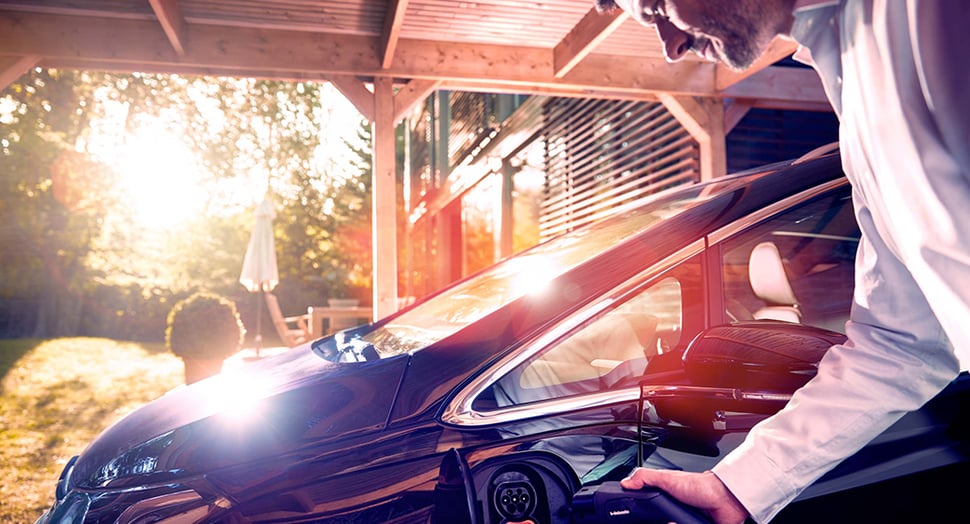 Charging your electric vehicle with a home charging station has benefits compared with public stations.
Charging your electric vehicle with a home charging station has benefits compared with public stations.
If you’re getting ready to buy your first electric car, you probably have some questions about charging your EV at home. As someone who’s always relied on gas to keep their car running, the idea of charging your vehicle in the comfort of your own home might seem too good to be true. But it’s not!
You’ll find many more benefits to home charging stations than public charging stations. Overall, they’re less expensive, more convenient and completely safe (so long as they’re installed properly). If you’re still on the fence, here are the top three benefits to installing a home charging station.
1. Cost efficiency
As opposed to buying battery power from a third party every time you need it, you can pay a flat fee for a residential charging station and have unlimited energy from the same source that keeps your house warm and your refrigerator cold. Though you may see a small spike in your electrical bill, you’ll still save money by saving yourself trips to public charging stations.
Finding your own affordable home charging station is easy to do. Depending on the type of charger you go with (Level 1, Level 2, or Level 3), the cost will be anywhere between $300 to $2000. It’s important to note that the price of your charger will be separate from the price of the installation. Most EVs will come with a Level 1 charger when you purchase them, but they are slow charging speeds.
Hiring an EV-certified electrician is necessary to install your home charger, especially if you purchase a Level 2 charger. The cost of a residential charger installation service can vary so do your research beforehand. Over time, these expenses will pay for themselves since you won’t have to use nearly as much battery power from public charging stations. Also, you won’t have to pay higher rates set by third-party power providers like Shell or BP.
2. Convenience
On average, with a Level 2 charger, it takes about four to six hours to fully charge your EV. Let’s say you have to wake up early tomorrow and drive 50 miles to visit your grandparents. Your EV is running low on battery and you don’t have a charger installed at home, so you have to go to a public charging station. Are you really going to wait in your car for six hours at a public charging station? What if there’s a line and you have to wait even longer before plugging your car in?
The same scenario is much more manageable with a residential charging station. All you have to do is drive home, plug the car in, and go to sleep. Then, when you wake up in the morning, you’ll have a fully charged car ready to hit the road. Clearly, the convenience of a home charging station cannot be matched by a public charging station.
3. Safety
Charging at home is safer than charging in public for a variety of reasons. First, public areas are generally more dangerous than residential areas. When you charge your EV in public (which can take a long time, as mentioned earlier), you’re assuming the same risks as parking your car on the street or in a garage. There’s always a chance that it could get vandalized, stolen, or damaged by natural elements such as floods, hail storms, lightning storms, fires, etc. By keeping the charging at home, you’re keeping your EV and yourself safer.
As long as you have the correct equipment and the help of a professional residential charger installation service, the process of charging your EV at home is very safe. Your EV-certified electrician will look at the electrical wiring in your house and address any issues that may get in the way of the installation.
For example, Level 2 chargers require one dedicated 240-volt circuit for a safe and efficient charge. So if you only have one circuit in your garage and it’s being used to power a refrigerator, you’ll either have to find another source to power the refrigerator or build an entirely new circuit. Regardless, the installation service team will help make any adjustments necessary to get your charger up and running. Finally, once you’re home charging station has been set up, your EV-certified electrician will train you on how to use it safely.
Interested in learning more about the benefits of a home charging station? Connect with us at Webasto today!
SOURCES:
- https://www.homeadvisor.com/cost/garages/install-an-electric-vehicle-charging-station/#level1
- https://roboticsandautomationnews.com/2019/05/01/top-20-electric-vehicle-charging-station-companies/22138/
- https://www.myev.com/research/ev-101/what-it-costs-to-charge-an-electric-vehicle
- https://chargedevs.com/newswire/heres-what-you-need-to-know-about-ev-charging-station-safety/
- https://www.theelectricconnection.com/3-benefits-install-home-ev-charger/

